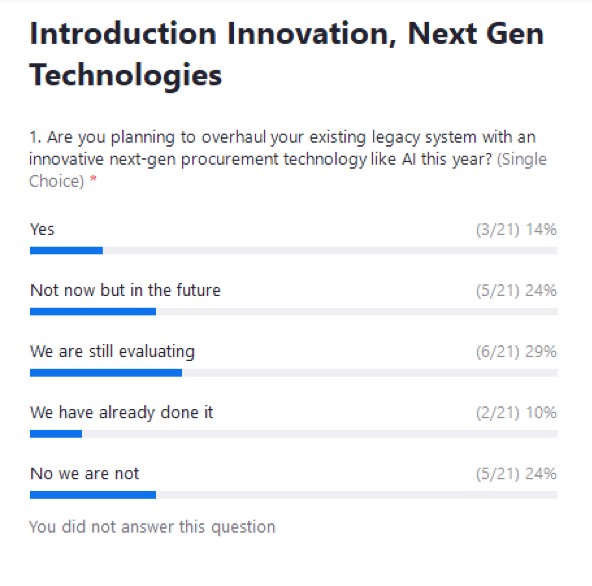Forty years ago, I entered the high tech field. Back then, there wasn’t a Microsoft, let alone DOS or Windows. CPM was the operating system for nascent PCs. Radio Shack was still selling build-your-own computers, and a basic Apple II with a green phosphorous screen and dot-matrix printer sold for $13,000.00.
Not long afterwards, with the introduction of VisiCalc, the world’s first spreadsheet, the personal computer rapidly evolved from an enthusiast passion to a viable business tool. By the way, I find it ironic that with all of the technological breakthroughs over the decades, the spreadsheet is still the “go-to” tool for procurement. I will talk about that momentarily.
So, you may be wondering why I am taking this nostalgic technological journey?
For expedience, I will avoid providing a chronological timeline of the industry’s evolution and cut to the chase. Based on the recent poll results from a panel discussion I moderated earlier this week, it seems that procurement, figuratively speaking, is stuck in the seventies tech-wise.
As you peruse the above graphic, you will note that 77 percent of those responding to the question about adopting an “innovative next-gen procurement technology” indicate that their company is on the sidelines. Even more surprising is that 24 percent are not even considering a next-gen tech option.
It is only fair to say that the “towers of gold, feet of clay” inactivity are not solely a procurement issue.
Back To The Spreadsheet
According to a May 2021 article on spreadsheet usage, “Between 70% and 80% of businesses still heavily rely on spreadsheets for tasks including customer relationship management, reporting on business data, and financial reporting.” The unwavering commitment to spreadsheets introduced in 1979 is puzzling, as “they aren’t equipped to deal with these functions at an enterprise level.”
Think about this latter point for a moment regarding the poll results. The percentage of organizations that continue to rely on spreadsheets is virtually the same as that of organizations that admit to standing on the sidelines regarding technological advancement. Is this a coincidence?
The results from a 2019 Deloitte CPO Global Survey may help to shed some light on the above question.
Digital Transformation Of Procurement A Bust?
In my December 11th, 2019 post Deloitte CPO Survey: Digital transformation of procurement a bust?, I reported that “a large percentage of companies that have fully implemented these modern technologies are not actually satisfied with the results.”
The important question the above Deloitte survey results raise is why do most CPOs consider their digital transformation initiatives unsuccessful?
While I don’t think that there is a single and simple answer to that question as there is a myriad of complex and conflicting reasons, the three things about which I wonder are as follows:
- In the context of my panel discussion poll, of the 23% of the companies that have already implemented or are in the process of implementing next-gen procurement technology, how many are satisfied with the results?
- Suppose most companies that have implemented or are in the process of implementing a next-gen procurement technology are not happy with the results to date. What impact do their struggles have on the 77% of the companies that are still on the digital sidelines?
- To what degree does the prevalence of spreadsheet dependence play a part in the big picture?
From my perspective, the evolution of technology over the years has been nothing short of amazing. In other words, because today’s next-gen tech is intuitively user-friendly and can be up and running within weeks, if not days, I don’t believe that the veracity of the technology is what’s failing us.
The more I think about it; I believe procurement being “stuck” in the seventies has more to do with mindsets versus technology or technology limitations.
What do you think?

June 24th, 2022 → 7:51 pm
[…] April 29th, 2022 – Stuck In The Seventies: When It Comes To Digital Transformation, 77% Of Organizations Are Still On T… […]